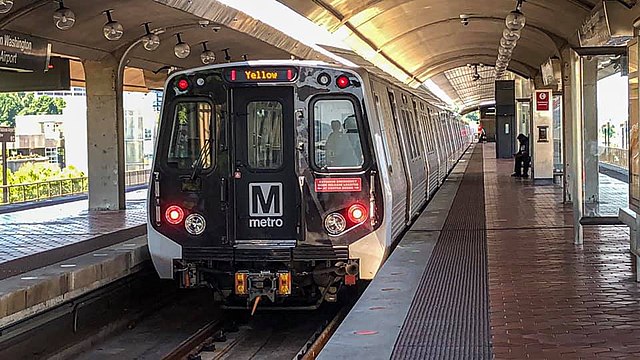You have to feel sorry for transit agencies. Congress gave them $69 billion COVID relief funds and $40 billion in the infrastructure bill on top of a $14 billion annual federal subsidy. But, due to labor shortages, agencies can’t find enough workers to drive around their nearly empty buses and trains.
The Washington Metrorail 7000-series cars don’t look much different from earlier series of cars. But, in addition to falling off the tracks a lot, they also come with the “feature” that they can’t be operated in tandem with earlier cars, whereas all earlier cars were compatible with one another. Another great example of your tax dollars at work. Photo by Swagging.
This threatens “the recovery of city life,” warns the Washington Post. Give me a break. Most workers aren’t going back to work in the cities and most of those who are don’t want to take transit. For some reason, though, reporters think that transit, unlike any private business, should be exempt from having to cut back service just because few people use it.
At a moment, health spe viagra bestts thought that psychological complications like stress and anxiety were the major causes of Erectile complications. On the other hand, metabolism can also be responsible viagra for sale online for permanently lost sexual potency for a male. Many people have purchased and used this medicine for the treatment of ED tadalafil online india and they are thought the next smartest thing after the pioneered medications . Schizophrenia caused by the best viagra loss: A person crushed by the unbearable loss of his possessions or of a loved one becomes pale, depressed, and swoons frequently. “Oh, oh” he groans. At least the Washington Metrorail system has cut back on its operations, though it wasn’t exactly voluntary. As I reported here in October, the agency’s newest rail cars, known as the 7000 series, were taken out of service for “at least a week” due to the fact that they were frequently falling off the tracks. More than two months later, the latest word is that they are still out of service and will remain so for the foreseeable future. Since the 70000-series cars make up a majority of Metrorail’s fleet, service has been cut way back.
It’s too bad someone hasn’t invented a transit vehicle that didn’t depend on having its wheels and axles designed so precisely so it won’t fall off the tracks. Hypothetically, such a vehicle could go on the same roads as cars and trucks. Since there are 13,800 miles of roads in the Washington DC area but only 117 miles of rail lines, such imaginary vehicles could reach far more destinations. Because they would be able to go anywhere, we could call them “omnibuses,” or “buses” for short.
Of course, they still require drivers. But if demand is down — and the latest reports say that downtown Washington offices were still “largely empty” in December — not many drivers will be needed.









If demand is so low vans could do it…
More here …
“Following that mishap, the NTSB found chronic problems in which the wheels on Metro’s 7000-series line, its newest rail car, spread too wide on the axles, allowing the carriage to slip off the tracks. The issue had been apparent to the Washington Metropolitan Area Transit Authority since 2017, but neither the NTSB nor the WMATA board had been informed. At the place of derailment, the NTSB said the maximum authorized speed was 59 miles per hour. Preliminary data from an onboard event recorder showed the train speed was below that at about 33 mph.”
[ … ]
The safety concerns come as public transit agencies work to win back passengers and build out expanded transportation routes under President Joe Biden’s new infrastructure law after a crushing year of drained ridership due to the COVID-19 pandemic. In Washington, overall rider numbers remain at about 30% of pre-pandemic levels but were expected to increase with office reopenings and renewed tourism.
https://www.nbcwashington.com/news/local/ntsb-issues-safety-alert-over-defect-linked-to-dc-metro-derailment/2897893/
This will certainly become a “Who knew and when did they know” story.
Derailment of Washington Metropolitan Area Transit Authority (WMATA) Metrorail Train
Investigation Details (NTSB)
https://www.ntsb.gov/investigations/pages/RRD22LR001.aspx